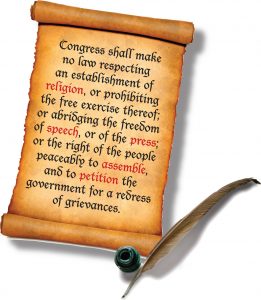What were they thinking?
Recent rulings by the U. S. Supreme Court, related to the First Amendment to the Constitution, have failed to sooth or quell the bilious dissentious acid that has roiled up within the throats of the governed masses. These decisions are especially surprising in light of the publicly acknowledged religious affiliations of the nine learned justices who so pompously preside from their exalted positions high upon their gilded thrones.

The First Amendment
Just in case word has failed to fall from the lofty heights whereupon they sit to resonate upon the ears of those who reside among the common throng—whose interests and rights these royal-robed erudite legal esquires are appointed to serve—of the nine Supremes two claim to be Jewish, one counts himself Episcopalian, and the remaining six call themselves Catholic. Apparently, these scholars of all things constitutional have skipped more than a few bible classes as they crawled onto their high chairs, or maybe they have something other than water in their sippy cups.
The First Amendment to the Constitution states “Congress shall make no law respecting an establishment of religion, or prohibiting the free exercise thereof; or abridging the freedom of speech, or of the press; or the right of the people peaceably to assemble, and to petition the Government for a redress of grievances.” A succinct forty-five words, it is the first and the tenth words that those whose sole purpose is to adjudicate have deemed to be the most problematic.
The framers of the Constitution made a conscious and deliberate effort to establish three branches of government: the executive, judicial, and legislative; each with separate, distinct, yet limited duties and responsibilities. Today, despite clear constraints to the contrary, we have three legislative branches eagerly knocking themselves silly trying to out-legislate each other, trusting that the people will be otherwise occupied with more mundane banalities.
That first word of the First Amendment reads “Congress”, at least in my book. Neither “Executive” nor “Judicial” can be found anywhere among those forty-five words, yet both the executive and the judicial branches, despite obvious constitutional limitations to their powers, can be found culpable in their zealous attempts to make new or to modify existing law.
Obviously it depends upon what your definition of “Congress” is. After all, it’s not fair that Congress should have all of the law-making fun, now should it? Lopsided, loopy, legal logic calls forth a new definition, one that is more inclusive, more egalitarian, and fair to everyone, especially to those fair branches who feel marginalized, discriminated, and mistreated by that unjust, unfair system delineated in said constitution. So Congress should now allow all branches of government to legislate. No longer should Congress be allowed to deny the disenfranchised executive and judicial branches their right to legislate.
And then there is that pesky tenth word: “religion.” What were the writers of the constitution thinking? Everyone knows that you don’t talk about religion, so why would the framers make such note of it?
Rather than attempting to answer those questions, perhaps another set of questions would better serve us here: “What exactly is religion?” and “What or whom falls within the aegis of said religion?” The answers to those questions may surprise and lead some where they do not want to go. Until next week.
